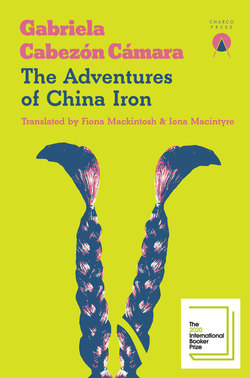Читать книгу The Adventures of China Iron - Gabriela Cabezón Cámara - Страница 12
На сайте Литреса книга снята с продажи.
ОглавлениеDragons and My Pampa All Mixed Up Together
While the land grew into a whole globe in front of me, another world took shape on the wagon. Me, Liz and Estreya were a trinity, within a rectangle starting from the oxen, one line along the roof, another at the trunk to the rear of the wagon and one running along the ground.
‘Only here in the pampa could a wagon create a bird’s-eye view’, observed Liz and so I found out what perspective was and noted that indeed, the few animals that stand out on the plains – hares, cuys and armadillos, the flamingos in the lagoons, herons, the occasional puma if we managed to see one – are always alert and quick but they take fright at just about everything. Anyway, the fauna of the flat pampas seemed to be stuck to the ground. The animals didn’t stretch up like giraffes, those amiable-looking, long-necked animals that eat from the tops of trees; nor did they extend themselves like gigantic elephants, using their trunks like hands. From up high or from down low the world looked different; it also looked different from behind a turning wagon wheel or from the highest branches of an ombú. In those days of discovery I tried looking from lots of different angles: I walked on all fours seeing what Estreya saw, the pasture, the creepy crawlies that went about on the surface of the earth, cows’ udders, Liz’s hands, her face, food on plates, and everything that moved. I leant my head on the heads of the oxen and I put my hands next to my eyes and I saw what they saw, only what was right in front of them, the cattle track and the uncertain horizon they strove to reach. I also stood on my hands, seeing first feet and knees and wheels and hooves and then what was above them. And I began to see other perspectives: the Queen of England – a rich, powerful woman who owned millions of people’s lives, but who was sick and tired of jewels and of meals in palaces built where she was monarch of all she surveyed – didn’t see the world in the same way as, for example, a gaucho in his hovel with his leather hides who burns dung to keep warm. For the Queen, the world was a sphere filled with riches belonging to her, and that she could order to be extracted from anywhere; for the gaucho, the world was a flat surface where you galloped about rounding up cows, cutting the throats of your enemies before they cut your own throat, or fleeing conscription and battles. I took over the cooking some nights so that Liz could draw all the things I couldn’t quite imagine from her descriptions: I had my special loves. I loved the tiger, like a giant orange stripy puma, I loved the hippopotamus, an animal with an enormous mouth and the square teeth of a child, a kind of wagon with hard skin and four fat short legs, a creature that likes to live inside rivers, and I loved zebras, those African horses with stripes. But the dragon aroused such passion in me, that beautiful beast made from horrible beasts: the eyes of a locust, the horns of a zebu, the snout of an ox, the nose of a dog, the whiskers of a catfish, the shaggy mane of a ñandú, the tail of a viper, the scales of a fish, the claws of a gigantic chimango, and with potent phlegm made of fire. The dragon was an animal that I liked to imagine flying above our heads and over our roof like a guardian angel: why shouldn’t a wagon be a house protected by a dragon? Liz liked to captivate me, she needed my awe-struck gaze, my laughter, the joy that her tales and her exquisite drawings, so beautifully precise, gave me. This I understood when I saw myself drawn by her, looking just like what I saw every morning in the looking glass, but made of lines, without colour. She told me the story of the dragon one night, while I was grilling some tararira fish I had just caught. About how the first four dragons had been born in the China Sea, and how they played around flying and swimming and breathing fire all the time; about how one day they felt sorry that men were going hungry, and about how they flew to see the Emperor of the Sky who was listening to a fairy orchestra in his jade palace. About how he turned to them, furious at having been interrupted, and although he promised rain, the rain never came; about how the four dragons then decided to take water to spit on the earth, about how the emperor got angry, about how he buried them under rocks as enormous as everything we could see as far as the horizon; about how the dragons cried and cried until they turned to water and formed the four rivers of China that were called the Long River, the Yellow River, the Black River and the Pearl River, because those were the dragon’s names.
I slept like a baby once Liz had explained to me what jade, fairies and an emperor were, and what the fire was that came out of the insides of those good animals who were turned to water. I put the shotgun away, dragons and my pampa all mixed up together, all the while asking myself if it was thanks to the dragons that the whole earth shone when the river burst its banks.
